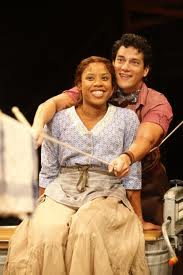In today’s Wall Street Journal drama column I review two shows, one in Washington, D.C. (Arena Stage’s Oklahoma!) and one off Broadway (the world premiere of Neil LaBute’s The Break of Noon). Here’s an excerpt.
* * *
Corny, charming, and as handsomely made as a hand-sewn quilt, “Oklahoma!” is one of the permanent landmarks of American musical theater. Though scholars continue to quarrel over whether the first of the Richard Rodgers-Oscar Hammerstein II collaborations was also the first “integrated” musical–a show, that is, in which music, lyrics, book and choreography all work together to advance an emotionally serious plot–contemporary audiences don’t care whether it deserves priority over, say, “Pal Joey” or “Porgy and Bess.” Either way, they like it fine, and show no signs of longing for some fancy director to treat it to a high-concept staging. Nor has Molly Smith, the artistic director of Arena Stage, done anything of the kind. Ms. Smith’s “Oklahoma!” is a perfectly, almost baldly straightforward production that deviates from the norm in only two ways: It is performed in the round by a multicultural cast whose members include a Latino Curly (Nicholas Rodriguez) and a black Laurey (Eleasha Gamble). Otherwise, this is much the same “Oklahoma!” that your grandfolks loved.
 Is that good enough for 2010 and the inaugural production of the newly built Mead Center for American Theater? Arena Stage’s enthusiastic audiences clearly think so, and up to a point I’m inclined to agree with them. Ms. Smith’s unselfconsciously lively staging, after all, is full of the high-stepping energy without which no production of “Oklahoma!” can hope to make its mark. What I miss, however, is any sense that we’re being told something about the show that we didn’t already know….
Is that good enough for 2010 and the inaugural production of the newly built Mead Center for American Theater? Arena Stage’s enthusiastic audiences clearly think so, and up to a point I’m inclined to agree with them. Ms. Smith’s unselfconsciously lively staging, after all, is full of the high-stepping energy without which no production of “Oklahoma!” can hope to make its mark. What I miss, however, is any sense that we’re being told something about the show that we didn’t already know….
Neil LaBute is back again, and I wish I could say that he’s returned to form after a long, dull stretch. No such luck. “The Break of Noon,” like all of his plays since “Fat Pig,” starts strong, loses steam and drifts all over the road before coasting to a dead stop.
Part of the problem is that Mr. LaBute is seeking this time around to breathe life into a musty plot twist that dates back to Edwardian times: How might the modern world respond to a person who claims that God has spoken to him? In this umpteenth iteration, we get a regular-guy businessman named, predictably enough, John Smith (David Duchovny). The only survivor of a mass murder, John believes that God told him midway through the shootings that “you shall be saved.” The experience transforms him, though not so much as to prevent him from capitalizing on the transformation by selling his story to the media, and for the rest of the evening we watch him interact with a string of skeptics, including his ex-wife (Amanda Peet), a cynical talk-show host (Tracee Chimo) and the detective in charge of his case (John Earl Jelks), all of whom are variously disinclined to take his implausible tale at face value.
As usual with Mr. LaBute, the first scene, a monologue in which John tells what happened on the fatal day, is pointed and powerful, but nothing that happens thereafter is half so fresh…
* * *
Read the whole thing here.
Terry Teachout on the arts in New York City
An ArtsJournal Blog
